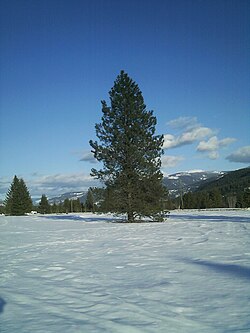Krestova
Krestova | |
|---|---|
Unincorporated settlement | |
| Coordinates: 49°26′39″N 117°35′1″W / 49.44417°N 117.58361°W | |
| Country | Canada |
| Province | British Columbia |
| Regional district | Central Kootenay |
| Established | 1911 |
Krestova is an unincorporated community of about 150 people[1] in the Kootenay region of British Columbia, Canada. The community was established by members of the Doukhobor religious group, who originally immigrated from Ukraine and Russia, in 1911-12.[2] The name comes from the Russian "Dolina Krestova (Долина Крестова)", meaning "valley of the cross".[2] The area is still home to the "Sons of Freedom" movement, which split from the Doukhobor community in the early 1900s.[3]
Geography
[edit]The town is located northwest of the confluence of the Slocan and Kootenay rivers, in the southern region of the province of British Columbia.[4] It is part of the Electoral Area H of the Regional District of Central Kootenay. The nearest large towns are Castlegar to the southwest, and Nelson to the east.
History
[edit]Krestova was the centre of decades of conflict between the Sons of Freedom, and the British Columbia government, the Royal Canadian Mounted Police (RCMP), and moderate Doukhobors.[5] The Sons of Freedom, also known as "Freedomites", had moved to Krestova in 1929[6] and were opposed to many government requirements, especially compulsory public education. Members burned down schools, public buildings, and their own homes - in the summer of 1953, 400 homes in the Krestova area were destroyed.[6] Freedomites staged protests against government actions, often in the nude. In the 1950s, Freedomite children in Krestova were forcibly relocated by the RCMP to a residential school in New Denver, B.C.[5][3] The provincial government issued a "statement of regret" for these actions in 2004.[3]
References
[edit]- ^ "Vancouver News | Local Breaking | CTV News Vancouver". bc.ctvnews.ca. Retrieved 2022-04-08.
- ^ a b "PLACE NAMES: Doukhobor place names of West Kootenay/Boundary". Castlegar News. 2019-12-14. Retrieved 2022-04-01.
- ^ a b c Woodcock, George; Rak, Julie. "Doukhobors | The Canadian Encyclopedia". www.thecanadianencyclopedia.ca. Retrieved 2022-04-01.
- ^ Akrigg, G. P. V. (1997). British Columbia place names. Helen B. Akrigg (3rd ed.). Vancouver [B.C.]: UBC Press. p. 144. ISBN 0-7748-0636-2. OCLC 180704220.
- ^ a b Gardner, Ray (March 1, 1950). "The Douks - B.C.s Holy Terrorists". Maclean's | The Complete Archive. Retrieved 2022-04-08.
- ^ a b Tarasoff, Koozma J. (2002). Spirit wrestlers : Doukhobor pioneers' strategies for living. Ottawa: LEGAS. pp. 12, 429. ISBN 1-896031-12-9. OCLC 50403000.


